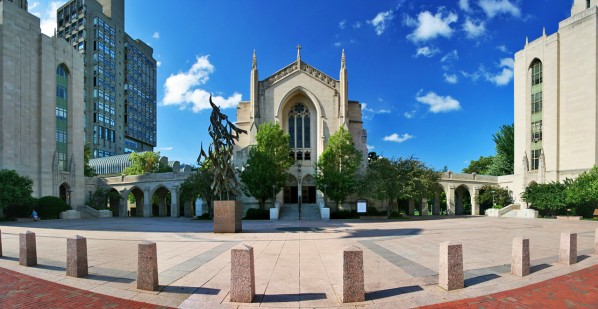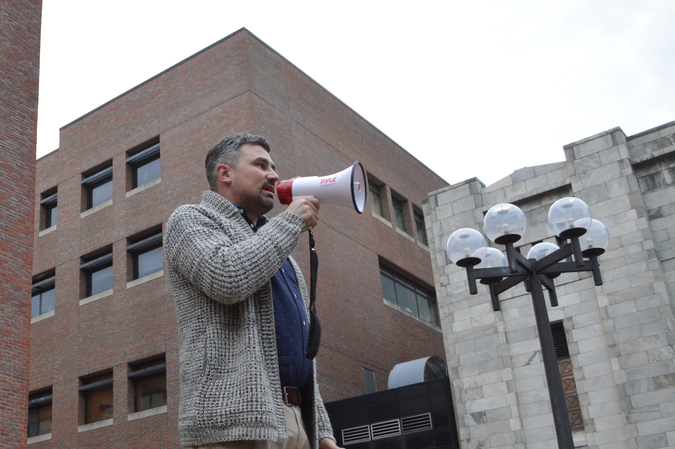
Life at BU is a curious kind of existence. In many ways, it’s every inch an urban university. In other ways, BU is enclosed in a social, geographical, and economic “bubble” that at once unites the campus and, perhaps, makes us more vulnerable. After a string of four armed robberies on campus in the last few weeks, it’s clearer than ever that such disparate aspects of life at BU affect not only our social lives, but also our safety–especially when, almost as suddenly as they occurred, the stories of the robberies have faded from consciousness.
For a few weeks, it appeared that Boston University was under grave threat. Phones on campus buzzed more often than usual, each time breaking the news of yet another armed robbery on the usually peaceful campus. Students took to Facebook and Twitter with statements of fear and biting commentary on BUPD’s effectiveness. After the fourth and final robbery, Dean Kenneth Elmore hosted a town hall meeting, attended by over 300 students full of concern about personal safety, racial profiling, and the role of the Boston, Brookline, and BU Police Departments in solving the crimes.
In addition to all this, an extravagant award of $10,000 was offered to anyone with information leading to the arrest of one or more suspects. All over the BU campus in the weeks after the first robbery on September 24, conversation was centered around the robberies: where and when each occurred, what color the guns were, the color of the suspects’ hoodies and backpacks, even the exact type of shoe one suspect was wearing at the time of the incident. All were heavily discussed, ranted over, and even made fun of throughout campus.
Then, between October 11 and 12, all three of the suspects for the second and third robberies were apprehended.
But is it over?
After the arrests, a sense of relief and completion settled over campus. For many, now the threat of armed robbery seems effectively neutralized–but should it be? The other two robberies have been hardly mentioned as of late, and both remain unsolved. Especially with the presidential election coming up, student interest appears to have shifted away from safety and crime on campus, as reflected by social media like Twitter and Facebook.
It seems rather short-sighted not only to forget that those responsible for the first and fourth incidents are still at large, but that also, in an urban environment like Boston, crimes like armed robberies are not terribly rare. Sometimes, it is easy to forget that Boston University is completely open and accessible to the rest of the city.
The “BU Bubble,” a lighthearted moniker for a certain coddling isolation that BU students may experience, can lead to a cavalier attitude about personal safety–walking through the main corridor of the GSU, one can see upwards of fifty unattended laptops, smartphones, and wallets left strewn about, unattended, on tables at any given time.
Also, attitudes towards police presence are still uncertain at BU. When the robberies began to happen more frequently, Facebook statuses abounded in outrage at the BU Police Department’s incompetence in solving the crimes. Some students asserted that BUPD should spend less time breaking up parties and more time solving the crimes.
This attitude towards police as mainly “party poopers” quickly vanished, however, whenever real threat of danger seemed imminent. Dean Elmore’s October 10 meeting seemed poised to counter this attitude, since it included a panel of officials from BUPD, Brookline Police Department and the Boston Police Department, who answered student questions about the robberies in an informal setting and wished aloud that busting underage drinkers could be their main occupation, rather than dealing with potentially violent crime on campus. It exposed a fundamental misunderstanding of what the police do at Boston University–perhaps because it’s hard to tell to what degree BU is part of the city and not just a campus.
In a few distinct ways, BU is isolated from the rest of Boston. The campus is bound north-to-south by the Charles and Muddy Rivers and east-to-west by the wealthy neighborhood of Brookline and a downtown area without many residences. The businesses lining Comm Ave, while not affiliated with BU, are host to almost exclusively BU students. Many buildings are only accessible by swiping one’s Terrier Card. And yet, BU’s campus is highly accessible to the rest of the city, whether by foot, bicycle, car, the B line, or the 57 bus. The Prudential Center is within view, and Kenmore Station, a major travel hub, rests squarely among several BU buildings.
So is BU apart from Boston, or a part of it? And which side is preferable? On the one hand, an enclosed and cohesive campus is desirable, as it offers a physical sense of community and a “typical” collegiate experience. On the other hand, the possibilities for fun and adventure in a metropolis like Boston are endlessly appealing. On my first tour of BU’s campus, I remember my tour guide rapturously describing BU as every inch the cosmopolitan city school. She rattled off the many dazzling urban attractions that Boston had to offer: the Common, Newbury Street, the North End, the MFA, etc. On the same tour, my guide enthusiastically described the campus as homey, close knit, collegiate, and cohesive, assuring parents of the safety and security of the school. I remember being confused–it seemed as though it was impossible to have it both ways.
In my time at BU since (I am currently a first-semester sophomore), I’ve learned that we do have it both ways. BU is very much a city school, albeit one nestled in a bubble. I’ve learned to navigate Boston smoothly and quickly, to take advantage of many of the city’s cultural offerings, and to cheer loudly at concerts when I hear the word “Boston.” At the same time, I am certainly cavalier about my own safety on campus, walking around Comm Ave and South Campus alone and using quite publicly the various techie gadgets I’m lucky enough to have.
It is for this reason that BU’s apparent amnesia (or perhaps just apathy) concerning the armed robberies is disturbing. While it’s true that the matter of the second and third robberies was swiftly dealt with, the assumption that BU is a complete safe haven is just as counterproductive an attitude as living in constant fear. Instead of giving undivided attention to issues like crime on campus for short bursts of time, perhaps it is best for students to get to know their own bubble; what it means, why it is both good and bad, and where its limits lie.



